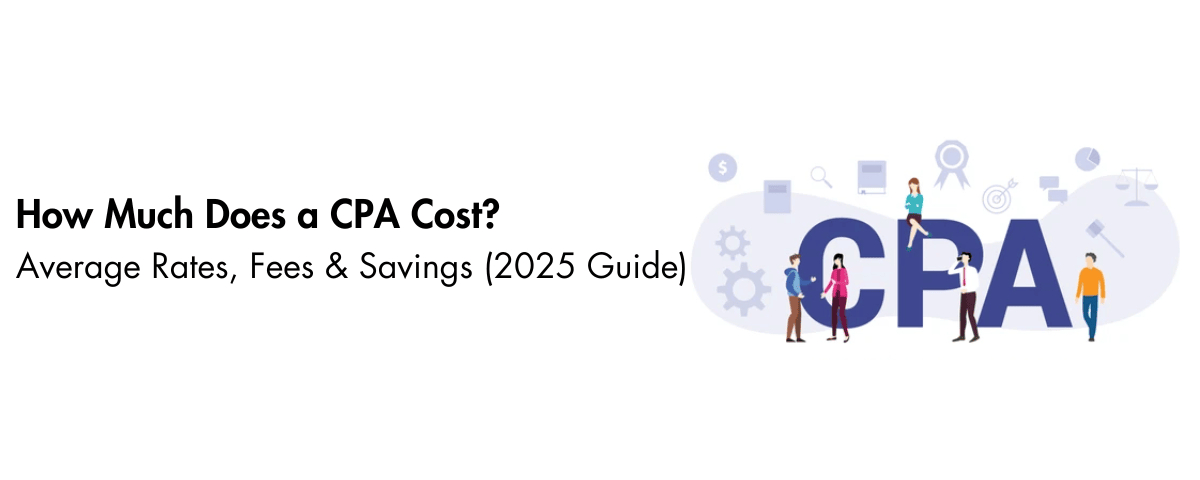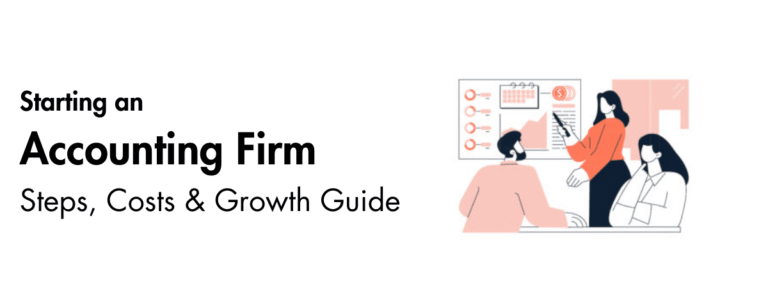Here is the headline for the United States in 2025. Most CPAs charge about $150 to $400 per hour for common work, and rates rise for senior specialists, complex planning, audits, and forensic engagements. Several up‑to‑date guides and industry references still land in that core range for 2025, with higher pricing in major metros and at larger firms.
If you want a quick rule of thumb, start budgeting at $150 to $400 per hour for general CPA work, then move higher for complex, urgent, or high‑risk projects.
Table of Contents
- Key Takeaways
- What Services Do CPAs Provide?
- Why Rates Look The Way They Do In 2025
- Typical Hourly Ranges By Service Type
- Snapshot Table, 2025 Hourly Ranges
- Factors That Push Rates Up Or Down
- Beyond Hourly, Pick A Pricing Model That Fits
- Costs By Business Size And Situation
- Real‑World IRS Representation Pricing
- How To Lower Your CPA Costs Without Sacrificing Quality
- The What‑How‑Wow Framework, Your Quick Guide
- A Simple Estimator You Can Use
- Common Pitfalls That Inflate Your Bill
- Example Scenarios With Estimated Totals
- FAQs
- First‑Meeting Checklist
- Email Templates You Can Copy
- Light‑Touch Ways Accountably Helps Firms, When It Truly Fits
- Key Takeaways, One More Time
- Conclusion
Key Takeaways
- Typical CPA hourly rates in 2025 sit around $150 to $400, with senior partners and niche experts above that band.
- Metro premiums are real. Urban quotes often run higher than rural or small‑city pricing, and remote options can narrow the gap.
- IRS representation often falls in the $200 to $500+ per hour range, and firms may quote flat fees for full defense phases.
- Staffing costs rose across public practice during the latest reporting cycle, which tends to push billing rates up.
- If your scope is predictable, flat fees, retainers, subscriptions, or value‑based pricing can lower your effective rate compared with pure hourly billing.
What Services Do CPAs Provide?
CPAs cover three big categories, and each maps to different pricing patterns.
- Tax, preparation and planning for individuals and businesses, multi‑state filings, equity compensation, entity elections, and IRS representation. Routine work usually falls in the $150 to $400 window, while representation and complex planning run higher, often $200 to $500+ per hour.
- Assurance, reviews and audits that increase confidence in your financials. Staff and seniors may price in the mid bands, while complex areas and partner review push toward the top end.
- Advisory, forecasting, cash flow, M&A readiness, valuations, systems, and forensic accounting. General advisory often bills in the upper bands. Forensic assignments usually command $300 to $500+ per hour, with retainers and expert‑witness schedules when needed. (knowledgepedia.org)
Think of hourly rates as a blend of who touches your file, how risky the work is, and how fast you need it done.
Why Rates Look The Way They Do In 2025
Two forces are shaping fees this year. First, firms report higher staff compensation, and that typically flows into billing rates across roles. Second, complexity keeps growing, multi‑state rules, equity comp, crypto traces, and data requests from lenders and agencies all demand senior attention. The AICPA’s 2025 PCPS National MAP Survey is the profession’s go‑to benchmark for firm metrics, and while detailed numbers are member‑only, the current cycle confirms the trend and provides the context many owners are seeing in quotes. (aicpa-cima.com)
Typical Hourly Ranges By Service Type
Tax Preparation And Planning
- General prep and planning, typically $150 to $400 per hour, with experienced planners and complex files trending above the midpoint.
- IRS representation, often $200 to $500+ per hour, commonly with a retainer. Some firms offer fixed fees for later phases of defense.
Audit And Assurance
Fieldwork performed by staff and seniors usually lands in the middle of the market range, while partner and specialist time moves higher for complex or public‑facing deliverables. Published 2025 overviews still anchor the broad average at $150 to $400, with top‑end rates significantly higher at large firms and in major metros.
Advisory And Forensic
- Strategy, modeling, and deal support often price toward the upper half of the $150 to $400 window, with top practitioners higher.
- Forensic accounting, commonly $300 to $500+ per hour, sometimes more for expert testimony, and retainers are standard. (knowledgepedia.org)
Snapshot Table, 2025 Hourly Ranges
| Service Type | Typical Hourly Range | Notes |
| General tax prep and planning | $150–$400 | Complexity increases time and senior review. |
| IRS representation | $200–$500+ | Retainers common, flat fees sometimes used for defense phases. |
| Assurance work | Mid to high within core range | Higher for partners and complex risk areas. |
| Advisory, general | Upper half of core range | Senior involvement raises the rate. |
| Forensic accounting | $300–$500+ | Premium for litigation and expert reports. |
Metro versus rural pricing, along with firm size and brand, explain much of the spread you see when comparing quotes.
Factors That Push Rates Up Or Down
Here are the levers you can control, plus a few you cannot.
- Experience and specialization, senior reviewers, forensic credentials, and SEC or public‑company experience command higher rates, particularly in large markets.
- Location and firm type, urban quotes trend higher than rural or small‑city firms, and national brands typically charge a premium. Remote work can soften those differences.
- Scope clarity and deadlines, vague deliverables, messy records, and rush timelines increase hours and who needs to be involved. That is where budgets slip.
- Compensation trends, rising staff pay across the profession often leads to higher billing rates by role, especially during tight labor markets. (aicpa-cima.com)
Beyond Hourly, Pick A Pricing Model That Fits
You are not stuck with hourly if predictability matters to you. Match the model to certainty and cadence.
- Hourly, best when scope is evolving, for example a notice, investigation, or an unclear set of PBCs for an audit. Ask for an hours range and a cap, then revisit after the first milestone.
- Flat fee, ideal when the deliverable is clearly defined, like a specific tax return or a one‑time advisory report. Get the assumptions in writing.
- Retainer or subscription, great for ongoing work, think monthly close, payroll, quarterly reviews, and on‑call Q&A, often at a lower effective rate than ad hoc hours.
- Value‑based fees, tie price to measurable outcomes, for example verified savings or a transaction milestone, and add a ceiling for shared confidence.
Quick Comparison, Fee Models
| Model | Best When | How It Helps |
| Hourly | Scope is uncertain | You pay for time, then convert later. |
| Flat fee | Deliverable is clear | Predictable and easy to compare. |
| Retainer | Ongoing cadence | Lower effective rate, faster response. |
| Value‑based | ROI is measurable | Aligns price to outcome, set a cap. |
Costs By Business Size And Situation
- Solo and very small businesses, expect most hourly work in the $150 to $300 band, and consider flat fees for recurring filings to stabilize cash flow.
- Multi‑state S‑corps and growing LLCs, advisory and compliance commonly land $200 to $400 per hour, and retainers often beat pay‑as‑you‑go on both cost and turnaround.
- Complex or high‑risk work, M&A, valuations, forensic, and audit support draw senior time and may reach $300 to $500+ per hour, especially in major metros. (knowledgepedia.org)
Real‑World IRS Representation Pricing
To make this concrete, here is how firms publish defense pricing.
- One Chicago practice quotes around $300 per hour for IRS representation, with flat‑fee audit defense commonly in the $2,000 to $5,000 range depending on scope. (lewis.cpa)
- A California practice lists typical flat‑fee ranges for later audit defense phases in the $7,500 to $12,500+ band for complex matters.
Practical move, begin hourly for discovery, then switch to a flat fee for the resolution phase once scope, years, and documentation are clear.
How To Lower Your CPA Costs Without Sacrificing Quality
You have more control than you think. Here is a simple playbook.
- Convert variable spend to predictable pricing, ask for a flat fee or a monthly retainer for recurring work, and request a written estimate with assumptions.
- Organize your records, reconciled accounts, clean support, and a single point of contact reduce back‑and‑forth and senior review time, which protects your budget.
- Time your projects, plan strategy work outside of March and April when calendars are packed, and you will get better attention and sometimes better pricing.
- Bundle services, tax plus bookkeeping plus payroll often prices better together than piecemeal hours.
A Firm Owner’s Note On Capacity
If you lead a firm, you already feel the squeeze, rising comp, tight deadlines, and seasonal spikes. One lever many practices use is compliant offshore staffing for repeatable back‑office work so seniors and partners can stay focused on advisory and review. Accountably partners with CPA firms, EAs, and accounting practices to provide expert offshore staffing and white‑label back‑office solutions aligned with U.S. compliance standards, IRS rules, and GAAP. Used appropriately, this keeps realization healthy and improves turnaround without changing the client experience. Mention it during capacity planning for next season.
The What‑How‑Wow Framework, Your Quick Guide
- What, most CPA hourly quotes cluster around $150 to $400, with specialists and partners higher, and metros pricier than rural areas.
- How, define scope, choose the right fee model, and keep your records clean. Ask for estimates by role, hours caps, and a weekly update until the first milestone is done.
- Wow, pull two advanced levers, schedule tax planning in the fall to avoid peak season, and appoint an internal owner for document requests on audits so you do not pay for delay.
A Simple Estimator You Can Use
Use this to show up prepared for your first call.
- Scope your needs
- 1040 only, or 1040 plus business
- Number of states involved
- IRS notice, audit, or collections
- Advisory deliverables and deadlines
- Estimate hours by role
- Staff, 2 to 8 hours
- Senior or manager, 1 to 4 hours
- Partner, 0.5 to 2 hours
- Apply 2025 ranges
- Staff, usually within the core $150–$250 slice
- Senior or manager, commonly $200–$400
- Partner or specialist, $300–$500+ depending on market
- Add complexity multipliers
- Multi‑state, add 10% to 30%
- Equity comp, K‑1s, crypto traces, add 10% to 25%
- Rush timelines, add 10% to 20%
- Cleanup or missing support, add 20% to 50%
- Pick the right fee model
- Hourly with a cap for discovery
- Flat fee once scope is stable
- Retainer for monthly or quarterly cadence
Ask for a one‑page estimate that lists hours by role, rates by role, assumptions, and change‑order triggers. That single page is your best cost control tool.
Common Pitfalls That Inflate Your Bill
- Unclear scope, you pay for rework and extra meetings
- Incomplete documents, you pay for idle time and rush reviews
- Scope creep without a change order, you pay premium hours at the end
- No single point of contact, you pay for repeated back‑and‑forth
- Peak timing, you compete with every other client in March and April
Example Scenarios With Estimated Totals
These are planning examples to help you talk to a CPA, not quotes.
- Single‑state 1040 with itemized deductions, staff 1.5 hours, senior 0.5 hour, partner 0.2 hour. Estimated total at typical 2025 rates, roughly $400 to $700.
- S‑corp with payroll in two states, plus an owner planning session, staff 4 to 6 hours, senior 2 to 3 hours, partner 0.5 to 1 hour. Estimated $1,500 to $3,000, often sold as a flat fee.
- IRS notice response for one year, senior 2 to 4 hours, partner 0.5 to 1 hour, retainer recommended. Estimated $600 to $2,000, then convert to a fixed fee if the matter expands.
FAQs
How much do most CPAs charge per hour?
A practical 2025 range is $150 to $400 for common work, with senior specialists and partners above that band. Quotes vary by location, scope, deadline, and firm size.
What does IRS representation usually cost?
Many firms quote $200 to $500+ per hour and ask for a retainer. Others offer flat fees for later defense stages once the facts are clear.
Are metro firms always more expensive?
Not always, but big‑city overhead and demand often raise rates. Some owners hire local CPAs for planning and use remote teams for routine work to balance cost and service quality.
Can I lower my effective rate without asking for a discount?
Yes. Choose a subscription or retainer for ongoing work, bring clean records, and plan outside peak months. You lower total hours, which lowers your effective rate even if the headline number stays the same.
First‑Meeting Checklist
Bring these items to cut discovery time and billable hours.
- Last two years of tax returns
- Year‑to‑date financials, bank and credit card reconciliations
- Payroll reports and state registrations
- Entity documents and cap table or ownership updates
- Equity compensation statements, RSUs and options if applicable
- Prior notices from the IRS or states
- A list of states where you have sales, payroll, or filing requirements
Email Templates You Can Copy
Discovery And Estimate
Subject, Scope and estimate request Hi [Name], We need help with [deliverable]. We can provide [documents] by [date]. We operate in [states], and our deadline is [date]. Please share an estimate with hours by role, rate by role, assumptions, and a not‑to‑exceed amount for phase one. Thanks, [Your Name]
Flat‑Fee Request
Subject, Fixed price request Hi [Name], The deliverable is clear and our inputs will be complete on day one. Can you quote a fixed price that includes one round of revisions and lists any exclusions up front? Thanks, [Your Name]
Light‑Touch Ways Accountably Helps Firms, When It Truly Fits
If you run a firm and want to keep partner time focused on planning and reviews, consider a capacity plan that routes repeatable production work to a trained team while you retain control of client experience and risk. Accountably partners with CPA firms, Enrolled Agents, and accounting practices to deliver expert offshore staffing and white‑label back‑office solutions that align with U.S. compliance standards, IRS regulations, and GAAP. When used thoughtfully, this can lower delivery costs, improve turnaround, and free your senior people for advisory without changing how you serve clients day to day.
Key Takeaways, One More Time
- Most CPAs bill $150 to $400 per hour for common work, and specialists price higher.
- Location, scope, and timing move the total more than the headline rate.
- Flat fees, retainers, and value‑based pricing can beat hourly when your scope is predictable.
- Organization is your superpower, clean inputs save hours and protect your budget.
- Firm leaders, use staffing models that protect realization without raising rates across the board.
Conclusion
You deserve pricing you understand and work you can trust. Define the job, pick the model that matches certainty, and agree on check‑ins that keep hours aligned with outcomes. If you lead a firm, plan capacity so your best people spend time where they add the most value. That way, you are not just buying hours, you are buying better decisions and fewer headaches.
Small disclosure, this guide was prepared by our editorial team and reviewed for accuracy. We used light research assistance to confirm 2025 ranges and trends, and we cited current public sources where helpful. Last updated October 7, 2025.







